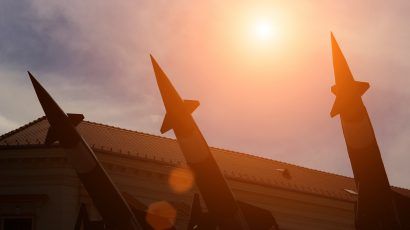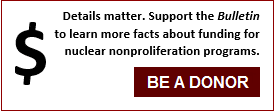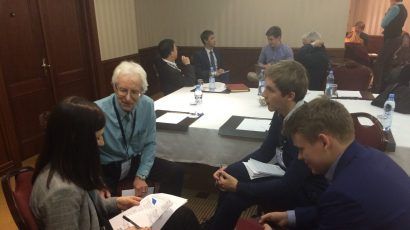Search results for nuclear terrorism
The 2016 presidential race is unusual in many ways, but a silver lining of sorts has emerged: For the first time since Lyndon Johnson’s famous “Daisy” political ad during the 1964 presidential campaign, the control that the president of the United States wields over the US nuclear arsenal is under serious discussion. In his introduction … Continued
A Nuclear Security Summit primer
A quick guide to some of our coverage in the run up to the 2016 Nuclear Security Summit
Nuclear Roundup: 4/19/2018
A daily roundup of quality nuclear policy news. North Korea Pompeo’s secret Korea trip may not save his nomination, but it could save Trump’s summit Trump says he’ll bail on North Korea talks if they’re not “fruitful” North Korea willing to discuss dismantling nuclear program, says Trump official North Korea wants total denuclearization, says Seoul … Continued
The effects of a single terrorist nuclear bomb
What would happen — environmentally, socially, economically, and politically — if terrorists managed to explode a single nuclear weapon in a city?
The full price of nuclear deterrence
We certainly can spend $1 trillion on nuclear forces at the expense of other military capabilities and domestic needs, but we may also gravely regret it.
The present and the past: Nuclear weapons in 2015
Top articles on the nuclear weapons landscape from the Bulletin's experts.
The potential dangers in medical isotope production
The medical isotope metastable technetium 99 emits gamma rays that physicians heavily rely upon to examine how organs such as hearts, lungs, and kidneys function. Technetium 99 is so beneficial to the medical community that it's used in approximately 80-85 percent of the world's diagnostic imaging procedures (cardiac perfusion scans and bone scans among them) and 12 million procedures in the United States alone. The size of the global nuclear imaging and therapeutics market is estimated at $3.7 billion per year.
The Nuclear Security Summit will leave unfinished work
The world has not secured all nuclear materials vulnerable to theft and sabotage. Will it find a way to keep working toward this goal?
Medical isotope production: The US must follow South Africa’s lead
A major outcome of the April 2010 Nuclear Security Summit in Washington, DC, was the commitment by 47 nations to collaborate in developing new technologies that require neither highly enriched uranium (HEU) fuels for reactor operation nor HEU targets for producing medical or other isotopes. This principle of HEU minimization also was included in the final document of the 2010 Non-Proliferation Treaty Review Conference, which was adopted by consensus.
Republicans budget more for nonproliferation than Obama
The White House fails to put its money where its mouth is on nuclear weapons security
Nuclear-security lessons from Australia
What Canberra has done—and can do—do to keep dangerous radioactive materials out of malicious hands.
Involuntary response
Earlier this month, widespread inaction on the increasing dangers posed by nuclear proliferation and climate change forced the Bulletin's Doomsday Clock to move one minute closer to midnight, indicating the mounting perils confronting humanity's survival. One factor pushing the clock forward to five minutes to midnight was the failure to ensure strict security and comprehensive international oversight for nuclear weapons and materials, which continue to accumulate in a few nations.
Where will the next president stand on nuclear weapons?
Probing the 2016 presidential candidates’ records on nuclear weapons makes for some interesting reading and could foretell US nuclear policies to come, yet the subject still deserves far more attention between now and November.
A race to the top in nuclear security strategy
What signatories of the Trilateral Initiative can do between now and the 2016 Nuclear Security Summit
Nuclear Roundup: 3/29/2017
A compilation of quality nuclear policy news published on the Web, around the world. Iran Nuclear Deal How the Nuclear Deal Has Reconfigured Iran’s Political Landscape Nikki Haley Slams the Iran Deal, Says It ‘Empowered’ Iran and Russia Russia and Iran’s Marriage of Convenience United States Q&A: Moniz looks to get U.S. nuclear scientists more … Continued
US budget cuts threaten nuclear safety
Nonproliferation projects are getting squeezed by sequestration and fiscal battles.
The future of global nuclear power through the eyes of young Russian and American professionals
As we witness the increasingly detrimental effects of global climate change, the role that nuclear power could play globally to mitigate its effects continues to be debated. The series of articles featured in the Bulletin in December 2016 aired a broad spectrum of opinions, ranging in assessment of the role of nuclear power from insignificant … Continued
An HEU milestone means a new challenge ahead
How will we track progress on nuclear security once removals are done?
Prague, revisited
Few national security issues are as important to President Barack Obama as reducing the threat posed by nuclear weapons. Obama devoted his first major foreign policy speech as president to the subject in April 2009 in Prague, where he pledged America's commitment to work toward a world free of nuclear weapons. In particular, the president laid out a series of interim steps that the United States must take to reduce the risk of a nuclear catastrophe.





